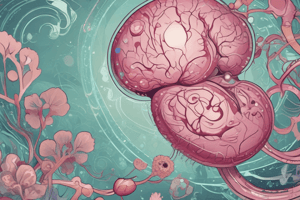Podcast
Questions and Answers
What is the main distinction between impotence and erectile dysfunction?
What is the main distinction between impotence and erectile dysfunction?
- Erectile dysfunction involves the inability to achieve sexual gratification, whereas impotence does not.
- Erectile dysfunction refers to an inability to engage in any sexual activity, while impotence refers to a specific condition.
- Impotence is a permanent condition, while erectile dysfunction can be temporary.
- Impotence is related solely to performance, while erectile dysfunction is specific to achieving an erection. (correct)
What does the term 'frigidity' refer to in the context of sexual health?
What does the term 'frigidity' refer to in the context of sexual health?
- The inability to conceive due to male factors.
- Incapacity to achieve an orgasm or initiate sexual arousal in females. (correct)
- The physical inability to engage in sexual intercourse.
- A temporary state of low sexual desire caused by hormonal changes.
Which of the following accurately defines sterility?
Which of the following accurately defines sterility?
- The inability to achieve sexual arousal or desire.
- A temporary inability of a male to procreate.
- The absolute inability of a person to conceive or father children. (correct)
- The failure to conceive after two years of unprotected intercourse.
What is the primary function of an Assisted Reproductive Technology (ART) clinic?
What is the primary function of an Assisted Reproductive Technology (ART) clinic?
Which organization is responsible for regulating assisted reproductive technology in the country?
Which organization is responsible for regulating assisted reproductive technology in the country?
What is the maximum number of oocytes that can be retrieved from a single oocyte donor during her lifetime?
What is the maximum number of oocytes that can be retrieved from a single oocyte donor during her lifetime?
What requirement must be fulfilled before any embryo can be used for implantation in a woman?
What requirement must be fulfilled before any embryo can be used for implantation in a woman?
Which of the following statements regarding parental rights of gamete donors is correct?
Which of the following statements regarding parental rights of gamete donors is correct?
Which is NOT a requirement for ART clinics regarding the treatment of oocytes and embryos?
Which is NOT a requirement for ART clinics regarding the treatment of oocytes and embryos?
What is the restriction placed on ART clinics regarding the supply of donor gametes?
What is the restriction placed on ART clinics regarding the supply of donor gametes?
Flashcards are hidden until you start studying
Study Notes
Impotence, Infertility, and Assisted Reproductive Technology
- Impotence is the inability to achieve an erection sufficient for intercourse.
- Erectile dysfunction specifically refers to the inability to achieve and maintain an erection adequate for satisfactory sexual intercourse.
- Quod refers to a male who may be impotent with one particular female, but not with another.
- Frigidity is the inability of a female to initiate or maintain sexual arousal, including a lack of desire or inability to achieve orgasm.
- Sterility is the inability of a male or female to procreate.
- Fertility is the ability to reproduce.
- Infertility is the failure to conceive after one year of regular, unprotected intercourse.
Assisted Reproductive Technology (ART)
- ART encompasses techniques that involve handling sperm and oocytes outside the body and transferring gametes or embryos into the woman's reproductive system.
- ART banks collect, store, and supply gametes and embryos to ART clinics or patients.
- ART clinics are facilities equipped to perform ART procedures.
- Commissioning couples are infertile married couples who seek ART services.
- Pre-implantation Genetic Diagnosis (PGD) identifies genetic abnormalities in embryos.
Regulations
- National Assisted Reproductive Technology and Surrogacy Board and State Assisted Reproductive Technology and Surrogacy Boards regulate ART.
- National Assisted Reproductive Technology and Surrogacy Registry maintains data about ART clinics, banks, services, outcomes, and other related information.
ART Clinic Duties
- ART clinics must provide services to commissioning couples or women aged 21-50 and men aged 21-55.
- Donors must be men aged 21-55 and women aged 23-35.
- Clinics must provide comprehensive counseling to commissioning couples/women about the implications of ART, including advantages, disadvantages, costs, and risks.
- Clinics must inform individuals about the rights of children born through ART.
- Written informed consent is required from all parties involved.
- Commissioning couples must obtain insurance for oocyte donors for twelve months.
- Embryos and gametes cannot be cryopreserved or used for other purposes without prior consent.
- No more than three oocytes or embryos can be implanted during one treatment cycle.
- A woman should not be treated with gametes or embryos derived from more than one man or woman in one cycle.
- Semen from two individuals cannot be mixed.
- Embryo splitting or twinning is prohibited.
- Posthumous gamete collection is permitted with prior consent of the commissioning couple.
- Ovum from a fetus cannot be used for in-vitro fertilization.
- All embryos must undergo PGD before implantation.
- Clinics cannot offer sex selection for children.
- ART banks cannot supply gametes from a single donor to more than one couple.
- An oocyte donor can donate only once in her lifetime, and no more than seven oocytes can be retrieved.
- Unused oocytes are preserved for the same recipient or given for research with written consent.
- Gametes and embryos are stored for up to 10 years.
- Transferring human gametes and embryos to other countries is prohibited.
- Children born through ART are considered the biological children of the commissioning couple, entitled to all rights and privileges of natural children.
- Donors relinquish all parental rights over children born from their gametes.
Studying That Suits You
Use AI to generate personalized quizzes and flashcards to suit your learning preferences.




